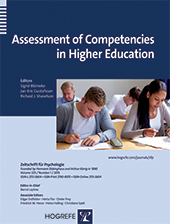Approaches to Competence Measurement in Higher Education
In a globalized knowledge-based society with increased demands for high levels of workforce competence, information about higher education’s capacity to develop competencies is highly necessary. However, before obtaining such information, competencies need to be assessed. Research of this type is only just beginning. The objective of this topical issue on the “Assessment of competencies in higher education” is to point out high-quality studies that integrate theory and methods to provide readers with an overview of the current state of research on competence measurement.
A major challenge of this type of research is to assess competencies – as the latent cognitive and affective-motivational traits underpinning domain-specific performance in varying (job) situations – reliably and validly, given the heterogeneous and changing nature of labor markets, competencies needed, and the inter- and intra-national diversity of higher education systems, institutions, programs, and processes. The research presented in this topical issue combines subject specialists with methodological experts to overcome these challenges.
Two papers cover the field of economics: Zlatkin-Troitschanskaia et al. (2015) examine measurement invariance of a US economic knowledge test in Germany and Japan, and Schnick-Vollmer et al. (2015) develop an assessment to examine professional knowledge in economics and business education. Three papers cover the fields of mathematics and science, including assessments of both cognition and affect: Jenßen, Dunekacke, Eid, and Blömeke (2015) apply a latent-state trait model to test the stability of mathematics anxiety and mathematics content knowledge across different measurements; Hartmann, Upmeier zu Belzen, Krüger, and Pant (2015) develop an assessment to examine student science teachers’ inquiry skills; and Rott, Leuders, and Stahl (2015) shape our understanding of mathematics teachers’ cognition by assessing knowledge and epistemic beliefs. The final paper by Stürmer and Seidel (2015) is on teachers’ professional vision assessed with a video-based tool.
To frame these papers, Blömeke, Gustafsson, and Shavelson (2015) review the current state of research on the assessment of competencies in higher education. They clarify fundamental conceptual and methodological issues showing that “controversies” are built on dichotomies that are not useful: for example, competence as an underlying trait versus competence as real-world performance or classical test theory versus item response theory. An opinion paper (Schober et al., 2015) concludes the topical issue; the authors were invited to contribute with an innovative view on self-regulated learning in university students.
References
(2015). Beyond dichotomies: Competence viewed as a continuum. Zeitschrift für Psychologie, 223, 3–13. doi: 10.1027/2151-2604/a000194
(2015). Validating test score interpretations by cross-national comparison: Comparing the results of students from Japan and Germany on an American test of economic knowledge in higher education. Zeitschrift für Psychologie, 223, 14–23. doi: 10.1027/2151-2604/a000195
(2015). Scientific reasoning in higher education: Constructing and evaluating the criterion-related validity of an assessment of preservice science teachers’ competencies. Zeitschrift für Psychologie, 223, 47–53. doi: 10.1027/2151-2604/a000199
(2015). The relationship of mathematical competence and mathematics anxiety: An application of latent state-trait theory. Zeitschrift für Psychologie, 223, 31–38. doi: 10.1027/2151-2604/a000197
(2015). Assessment of mathematical competencies and epistemic cognition of preservice teachers. Zeitschrift für Psychologie, 223, 39–46. doi: 10.1027/2151-2604/a000198
(2015). Modeling the competencies of prospective business and economics teachers: Professional knowledge in accounting. Zeitschrift für Psychologie, 223, 24–30. doi: 10.1027/2151-2604/a000196
(2015). Gaining substantial new insights into university students’ self-regulated learning competencies: How can we succeed? Zeitschrift für Psychologie, 223, 64–65. doi: 10.1027/2151-2604/a000201
(2015). Assessing professional vision in teacher candidates: Approaches to validating the Observer Extended Research Tool. Zeitschrift für Psychologie, 223, 54–63. doi: 10.1027/2151-2604/a000200



